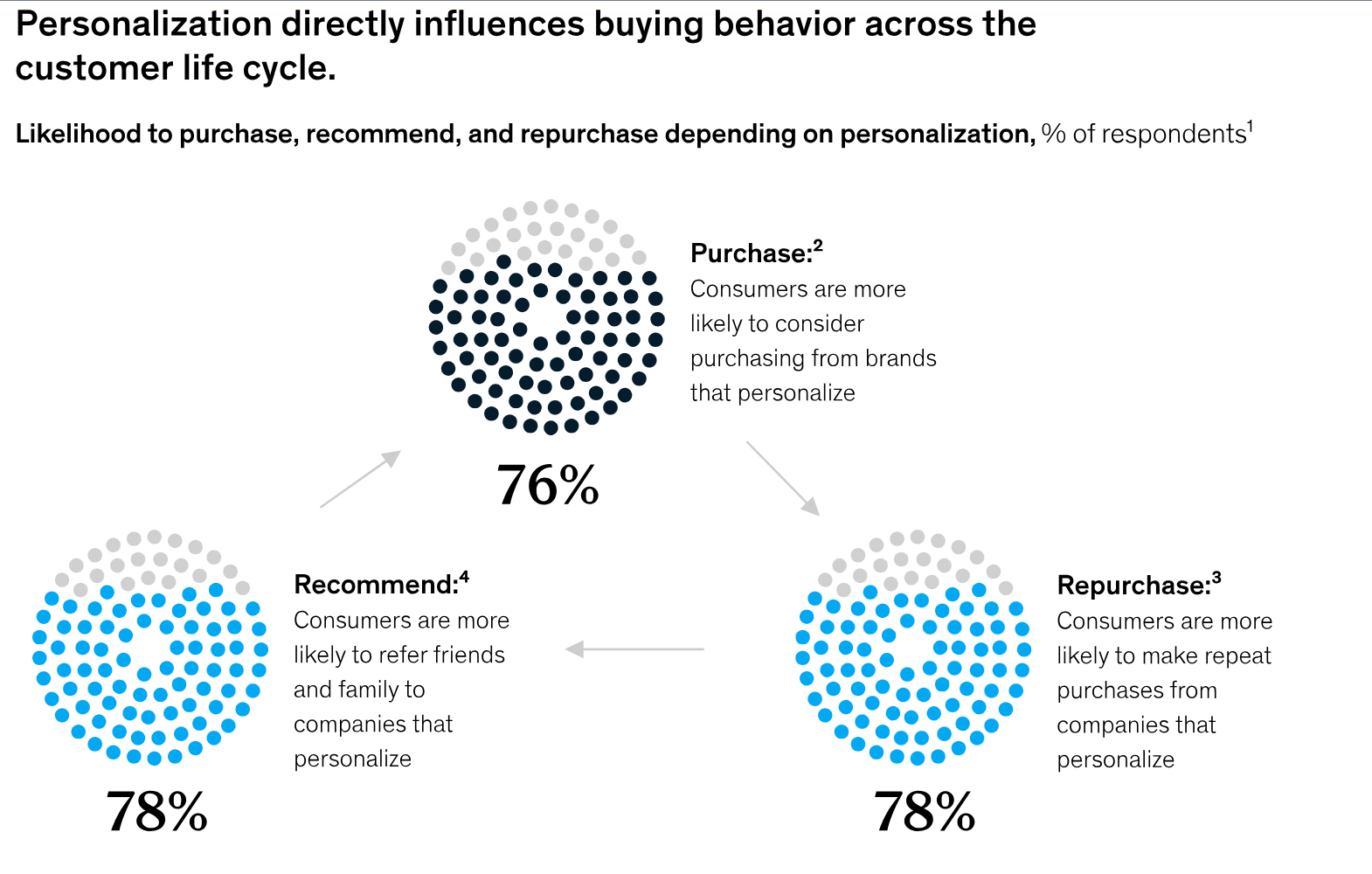Is there an industry that hasn’t been affected by Artificial Intelligence (AI) yet? We bet you can hardly answer because AI is being actively adopted here and there, helping many of us get answers to questions much faster than before, delivering services and help to the customers, and simply automating our habitual workflows. Regarding eCommerce, AI plays a big role in transforming customers’ shopping experience and helping businesses improve their sales. From enhancing user experience to optimizing order processing and delivery, AI has changed the way companies operate in the online marketplace. So, how exactly does Artificial Intelligence impact eCommerce website? Let’s find it out in this blog post. We will explore the profound impact of AI on eCommerce websites and discuss its implications for the future.
Personalization: Enhancing eCommerce Website UX
One of the most significant impacts of AI on eCommerce websites is its ability to enhance personalization. AI algorithms analyze vast data, including user behavior, purchase history, and social media activity, to provide personalized product recommendations. This level of personalization allows businesses to offer tailored shopping experiences to their customers, resulting in increased customer satisfaction and higher conversion rates.

With AI technology, eCommerce websites can now suggest products likely to interest individual customers based on their preferences and previous buying patterns. This personalized approach not only saves customers time by eliminating the need to search through countless product listings but also helps businesses increase their sales by presenting customers with relevant products they are more likely to purchase.
One of the vivid examples of AI personalization in eCommerce websites is displaying the “Customers also bought” section intended to encourage users to add more items to their cart. The approach is significantly valuable for brands working in all industries. It enables them to bring interactions with customers to the next scale, boosting customer engagement, conversion sales, and overall revenue.
For example, this is how the personalization feature is achieved on Amazon:

Despite sharing “Customers also bought” lists of products, eCommerce websites can implement various other AI in eCommerce implementations. Let’s enumerate several of the most common AI personalization use cases.
- Personalized product recommendations. AI personalization helps brands analyze vast historical data to provide relevant real-time offers. The approach allowed the beauty brand Yves Rocher increase purchase rates by 11x on their eCommerce website.
- AI-powered chatbots. Every eCommerce website maker will agree customer support is an indispensable element of every online store. AI chatbots can significantly improve the quality of assistance delivered to your web audience and reduce the response time. AI is capable of understanding customer queries and recalling past conversations with the same user, thus increasing the likelihood of delivering a better customer experience.
- Personalized website content. Whether you’ve built your eCommerce website from scratch or using eCommerce website design templates, implementing AI personalization lets your company show your customers the content they are most interested in watching and the moment they want to see it.
- Email content personalization. To prevent their messages from being marked as spam and their domains from being blacklisted, organizations should improve their email marketing campaigns. Using AI personalization, UK furniture retailer DFS experienced positive results in their email marketing efforts. They used contextual communications to ensure the appropriate message was sent to the right individual at the proper moment.
- Personalized ads. Organizations can now create personalized ads in real-time using key demographic and behavioral data, including social posts, comments, likes, and shares. This was not possible before the advent of AI. Rapha Racing, a company in the competitive cycling clothing market, quickly implemented personalized ad targeting from Bloomreach Engagement. Within just one hour, this implementation provided valuable insights into marketing spend and resulted in a significant 31% increase in purchase events observed in Facebook Ads Manager.

Optimizing Order Processing and Delivery
AI has also revolutionized the order processing and delivery processes in eCommerce. By harnessing the power of AI, businesses can streamline these operations for improved efficiency. AI-powered systems can automate order processing tasks such as invoice generation, inventory management, and shipping label creation, reducing the need for manual intervention.
Inventory management is a crucial part of delivery operations. AI can optimize inventory levels, minimize wastage, and enhance efficiency. Here’s how AI can help:
- Real-time Tracking: AI enables real-time inventory tracking and quick response to changing demand trends. This leads to improved efficiency, reduced stockouts, and enhanced customer satisfaction.
- Demand Forecasting: AI can accurately predict demand patterns, allowing you to adjust resources accordingly. This helps avoid overstocking or understocking, reducing the need for overtime and minimizing transportation expenses.
- Automated Reordering: AI-powered delivery management systems can automatically place orders when inventory falls below a specific threshold. This reduces stockouts and improves customer retention.
Furthermore, virtual assistants powered by AI can offer 24/7 support to customers, assisting them with inquiries or issues at any time. Implementing an AI-powered delivery management solution can significantly enhance customer satisfaction by:
Personalized Service
Utilizing AI technology, delivery management systems can analyze customer data to identify their preferences and needs. This enables you to offer personalized services tailored to each customer.
eCommerce Website Real-time Updates
Providing real-time updates on delivery status empowers customers with more control and transparency throughout the delivery process. This enhances their overall satisfaction and experience.
Customer Feedback Analysis
AI-powered delivery management solutions can also analyze customer feedback to pinpoint improvement areas. By making necessary changes based on customer feedback, you can enhance customer satisfaction and loyalty.
Strengthening Security and Data Protection
Security is a top concern for businesses and customers in the eCommerce industry. AI plays a crucial role in strengthening security measures and protecting sensitive data. AI algorithms can detect suspicious activities and prevent fraud in real time, significantly reducing the risk of unauthorized transactions.
Advanced AI systems can proactively identify potential threats by analyzing patterns and anomalies in user behavior, transaction history, and network traffic. By continuously monitoring and analyzing data, AI can detect and mitigate potential security breaches before they cause any harm. This level of security not only protects businesses from financial losses but also builds trust among customers, making them more likely to shop on eCommerce websites.
Leveraging AI Marketing Tools for Customer Engagement
AI has also transformed how businesses engage with their customers through marketing efforts. AI marketing tools enable companies to create targeted campaigns on various channels, including social networks, newsletters, and personalized emails. These tools leverage AI algorithms to analyze customer data, segment audiences, and deliver customized content to each customer.
For example, businesses can use AI to send personalized offers or promotions to customers based on their purchase history, browsing behavior, or demographic information. By tailoring marketing messages to individual customers, businesses can increase customer engagement and encourage them to return to their online platforms for future purchases. AI-powered marketing tools also provide valuable insights into customer preferences and behavior, enabling businesses to refine their marketing strategies and optimize their campaigns for better results.
Some of the most popular AI marketing tools include:
- Jasper AI marketing tool helps companies create marketing content like articles, social media captions, product descriptions, and blog post titles. You can model the content after your brand voice and turn it into a campaign. Pricing starts at $39/month for the Creator Plan, $99/month for the Teams plan, and custom pricing for the Business plan.
- Grammarly can be used on Docs, email, social media, and other online platforms. Grammarly not only catches errors but also helps adjust the style and tone of writing. It has generative AI features that provide written content based on prompts. There’s a free plan, and the Premium plan starts at $12/month per user, while the Business plan costs $15/month per user.
- Zapier supports over 5000 app connections and integrations, saving you time. You can use Zapier’s AI to build custom chatbots, sort data on spreadsheets, and identify workflow issues. There’s a free version with limited tasks per month, and paid plans start at $19.99/month for the Starter plan, $49/month for the Professional plan, $69/month for the Team plan, and $99/month for the Company plan.
- Manychat allows you to engage customers at different stages of their journey and drive more sales with personalized experiences. Manychat provides a library of chatbot use cases. Pricing starts with a free tier, and the Pro plan costs $15/hour. For the Premium plan, you’ll need to contact the company directly.
- SurferSEO handles everything from research to optimization, requiring you to hit the “publish” button simply. Other features include brief creation and plagiarism checker. Pricing starts at $69/month for the Essential plan, $149/month for the Advanced plan, $249/month for the Max plan, and custom pricing for the Enterprise plan.
These are only a few of the examples. When you google requests like “eCommerce website builder free,” “eCommerce website buy,” or “eCommerce website maker,” you will come across a bunch of other tools for implementing AI in eCommerce websites.
Dynamic Pricing with AI
Another significant impact of AI on eCommerce websites is dynamic pricing. Through AI analysis of competitor prices, businesses can adjust their pricing strategies dynamically. AI algorithms can monitor the prices of similar products competitors offer and recommend optimal pricing adjustments to businesses.
Dynamic pricing allows businesses to optimize their revenue by ensuring competitive prices while still maximizing profit margins. For example, if a competitor lowers the price of a product, AI can analyze the impact on sales and recommend a price adjustment to stay competitive. This real-time pricing optimization enables businesses to react quickly to market changes and stay ahead of the competition.
Conclusion
Artificial intelligence has brought significant transformations to the eCommerce industry. From enhancing personalization to improving security and optimizing operations, AI continues to shape the future of online shopping. By leveraging AI technologies, businesses can unlock new opportunities for growth while delivering exceptional customer experiences. As the eCommerce landscape evolves, companies must embrace these advancements and stay ahead of the curve to remain competitive in the ever-changing digital marketplace.
If you look forward to implementing AI in eCommerce, you may be interested in starting your journey with eCommerce website design templates. TemplateMonster digital marketplace is one of the most popular repositories of such products. Besides, they have prepared a special deal for our readers, offering a 7% discount on all eCommerce templates from their collection and a 10% discount on the MonsterONE subscription plans with the “SENUTO” promo code.
 Katherine Crayon
Katherine Crayon